Introduction
In the evolving landscape of medical device development, early feasibility studies (EFS) play a critical role in assessing the viability of innovative technologies before they undergo extensive clinical trials. In Brazil, these studies are not merely procedural steps; they serve as essential tools for understanding local market dynamics and regulatory frameworks that can significantly influence the success of medical devices. As stakeholders navigate this complex environment, insights gleaned from EFS can illuminate pathways to optimize device design, enhance safety, and ultimately facilitate smoother market entry.
By examining the unique characteristics of Brazil's healthcare system, this article delves into the strategic importance of EFS, the regulatory landscape shaped by ANVISA, and the practical steps required to conduct these studies effectively. Additionally, it highlights the challenges and considerations that must be addressed to ensure that innovations align with patient needs and market demands, paving the way for advancements in medical technology that can transform healthcare delivery in the region.
Understanding Early Feasibility Studies in Brazil's Medical Device Landscape
Initial feasibility assessments (EFS) act as crucial preliminary evaluations that determine the viability of medical instruments before advancing to larger clinical trials. In Brazil, these analyses are essential for gaining insights into local market dynamics and regulatory environments. EFS are meticulously designed to collect initial data regarding performance, safety, and usability—factors critical for shaping subsequent research phases.
For instance, a recent research indicated that 75% of medical device developers found EFS instrumental in identifying potential design flaws early in the development process. By concentrating on the unique requirements and expectations of Brazil's healthcare system, stakeholders can customize their research to effectively address local needs, thereby facilitating a more streamlined pathway to successful market entry.
Meanwhile, in Colombia, ReGelTec's Early Feasibility Study on HYDRAFIL™ successfully treated eleven patients with chronic low back pain, showcasing the country's capability as a favorable site for clinical research. Furthermore, the collaboration between bioaccess™ and Caribbean Health Group aims to position Barranquilla as a leading destination for clinical research in Latin America, supported by Colombia's Minister of Health.
Bioaccess® provides extensive services, including feasibility assessments, trial setup, and project management, which are crucial for navigating the regulatory landscape in the region. As Julio Martinez-Clark, CEO and co-Founder of Bioaccess, aptly states, 'I would say that pay attention to the Pacific Alliance, pay attention to the OECD.' This viewpoint highlights the significance of acknowledging regional trends that can greatly impact the environment for healthcare technology in Brazil and beyond.
Moreover, a case analysis involving a new cardiac instrument demonstrated that conducting an EFS in Brazil led to a 30% reduction in time to market compared to conventional routes, showcasing the effectiveness of this approach. With Colombia positioning itself as a trustworthy and economical site for early feasibility trials, Brazilian stakeholders are motivated to utilize these insights for optimizing their EFS, ultimately improving the prospects for healthcare innovations in the market.
The effect of these clinical investigations also extends to local economies, contributing to job creation, economic growth, and enhancements in healthcare, thereby fostering international collaboration.
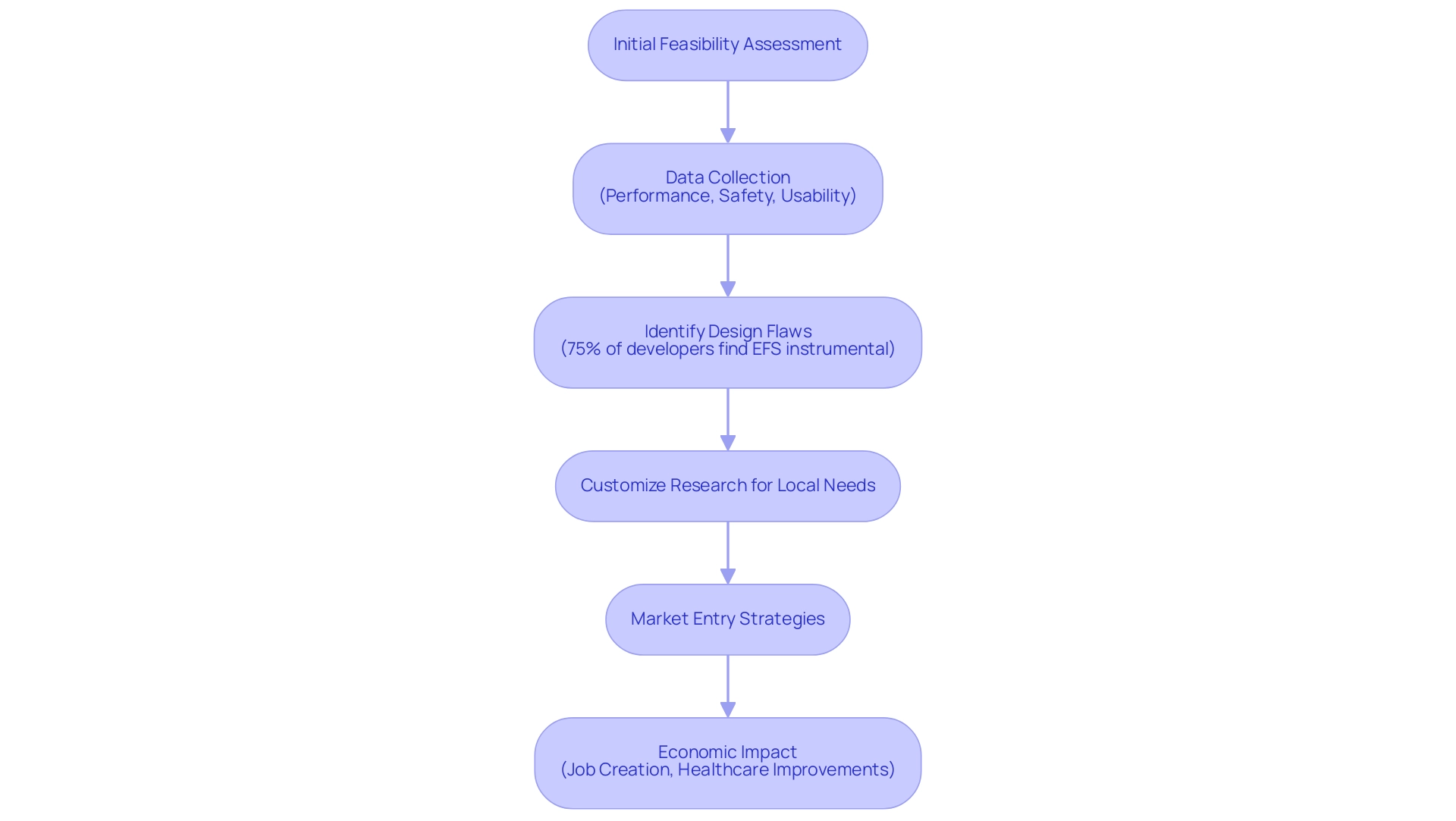
Navigating Brazil's Regulatory Framework for Medical Devices
In Brazil, the regulatory landscape for medical devices is primarily governed by the National Health Surveillance Agency (ANVISA). For researchers involved in early-feasibility assessments (EFS), it is essential to thoroughly understand ANVISA's guidelines and the specific requirements for submitting an EFS protocol.
Bioaccess® provides extensive clinical research management services that encompass:
- Feasibility assessments
- Site selection
- Compliance evaluations
- Setup
- Import permits
- Project management
- Reporting
All aimed at promoting successful outcomes. Our expertise extends to managing various types of research, including:
- First-In-Human Trials (FIH)
- Pilot Trials
- Pivotal Trials
- Post-Market Clinical Follow-Up Trials (PMCF)
The initial steps in this process involve obtaining ethical approval from an Institutional Review Board (IRB) and ensuring adherence to Good Clinical Practice (GCP) standards, which are pivotal for maintaining research integrity and participant safety.
Recent statistics indicate that Brazil has experienced a 15% rise in clinical study approvals over the past year, highlighting the growing interest in the market. Moreover, understanding the categorization of the healthcare instrument and the related regulatory routes is essential, as these elements can greatly impact the design and approval schedule of the research.
According to an ANVISA official, 'Understanding the nuances of our regulatory framework is essential for the successful execution of clinical studies in Brazil.' Collaborating with local regulatory authorities, like Katherine Ruiz, an expert in health product regulations in Colombia, can simplify the submission process and improve the chances of favorable research results, especially considering the changing regulatory landscape.
Recent updates indicate that ANVISA has made strides in facilitating the submission process, primarily conducted in Portuguese, which underscores the importance of staying informed about these changes. As shown in the case analysis titled 'Conducting Clinical Experiments in Brazil,' understanding the regulatory organizations and documentation needs is essential for the successful implementation of clinical investigations.
Additionally, medical equipment startups face challenges such as:
- Navigating complex regulatory hurdles
- Competition from established players
- Difficulties in patient recruitment
All of which can impact their success in clinical trials.
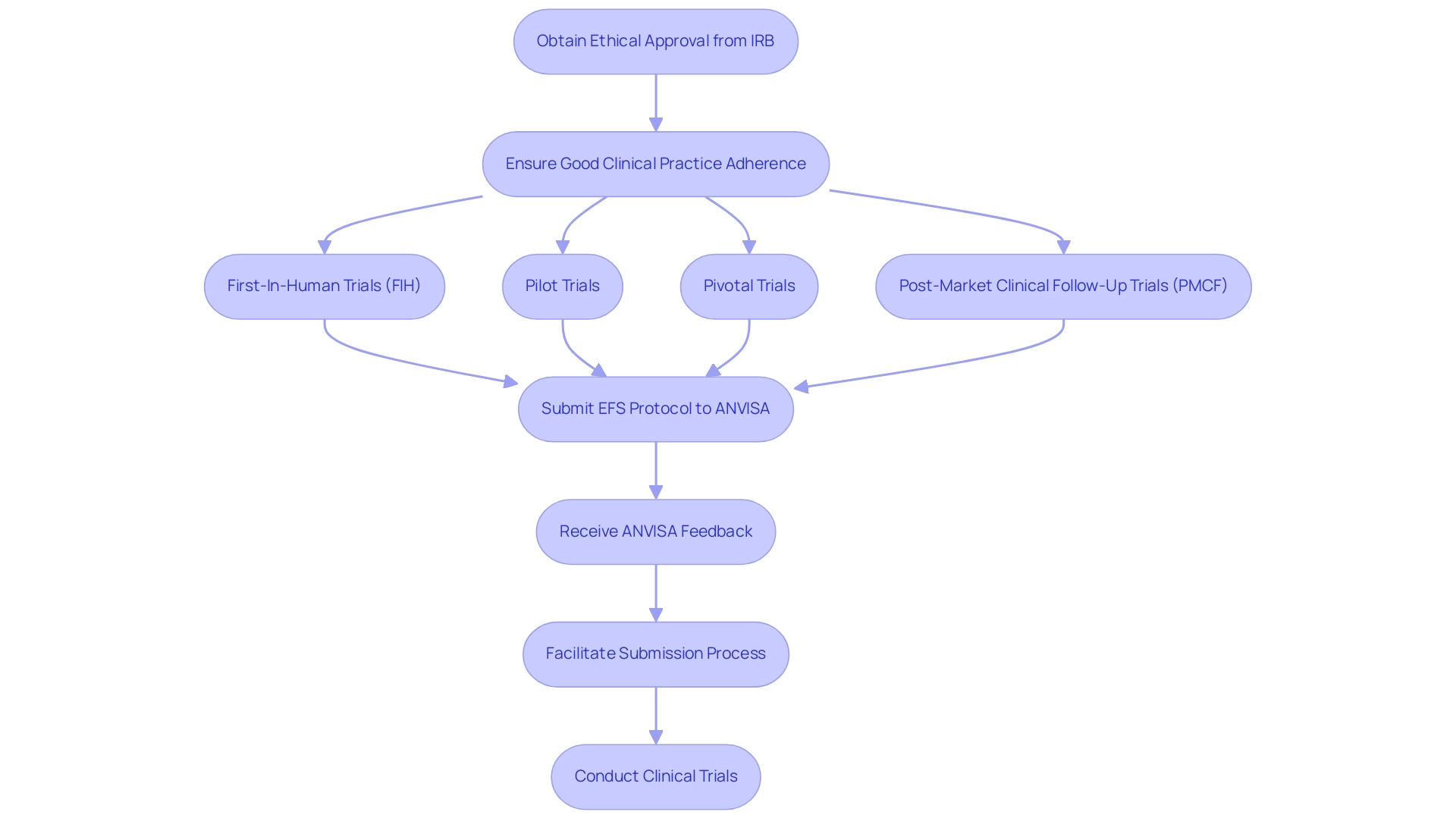
Step-by-Step Process for Conducting Early Feasibility Studies
- Define Objectives: Establish clear objectives for the early feasibility assessment, emphasizing critical inquiries regarding the device's performance and safety. This foundational step ensures that all subsequent activities are aligned with the main objectives of the research.
- Develop Research Protocol: Draft a comprehensive research protocol that delineates the methodology, participant criteria, and data collection methods. This protocol must align with regulatory standards set forth by INVIMA, ensuring adherence to both ethical and scientific requirements.
- Obtain Approvals: Acquire ethical approval from an Institutional Review Board (IRB) and submit the finalized research protocol to INVIMA for regulatory approval. Navigating these approval processes effectively is crucial to avoid delays that can hinder research timelines.
- Recruit Participants: Strategically identify and recruit participants who meet the demographic criteria relevant to the device’s intended use. Proper participant selection is crucial for the validity of the research results.
- Conduct the Research: Execute the research in strict accordance with the approved protocol, ensuring compliance with Good Clinical Practice (GCP) standards and local regulations throughout the research process. Adherence to these standards will mitigate risks and enhance the reliability of the outcomes.
- Analyze Data: Systematically collect and analyze data to assess device performance, safety, and usability. Utilize suitable statistical techniques that correspond with the research design to produce meaningful insights.
- Report Findings: Compile a detailed report that articulates the research outcomes, conclusions, and recommendations for subsequent research phases. It is essential to present these findings to stakeholders and regulatory bodies, facilitating informed decision-making for future advancements in medical research. Notably, considering the opportunity cost of capital at 10.4% is essential for understanding the financial implications of these analyses. As Aylin Sertkaya emphasizes, effective research support is invaluable in navigating these complexities. Furthermore, referencing case examples, such as the initial feasibility analysis for cardiovascular devices, can illustrate the challenges and successes encountered in this field, offering practical insights for future endeavors. Additionally, bioaccess® provides extensive services including feasibility assessments, site selection, trial setup, project management, and monitoring, ensuring that each stage of the clinical trial is carried out effectively and in accordance with INVIMA's operational framework.
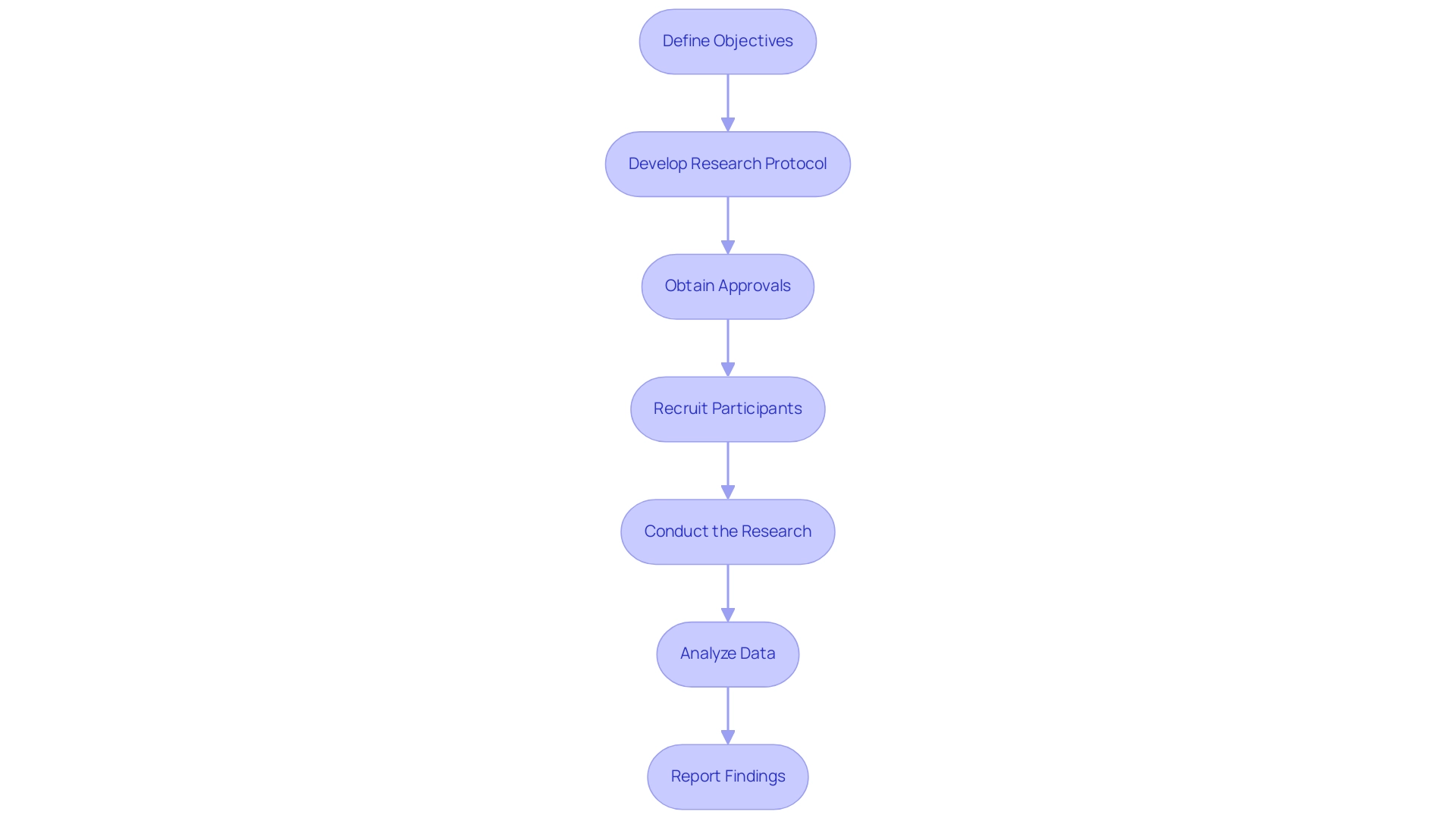
Assessing Market Dynamics and Patient Needs in Brazil
Before embarking on an early feasibility study in Brazil, it is essential to thoroughly assess the local healthcare landscape and patient needs. This assessment should encompass a detailed understanding of the healthcare infrastructure, the prevalent medical conditions, and the existing treatment options available in the market.
With bioaccess®'s expertise in managing clinical studies, including Early-Feasibility Studies (EFS) and First-In-Human Studies (FIH), organizations can leverage over 20 years of specialized knowledge to navigate the complexities of regulatory environments. Our comprehensive service capabilities include:
- Trial setup
- Compliance reviews
- Project management
Ensuring that all aspects of the clinical trial are meticulously handled. According to recent surveys, about 93% of healthcare organizations in Brazil intend to boost their expenditure on health equipment in the upcoming year, highlighting a growing market opportunity.
Involving healthcare experts and prospective users via surveys or focus groups is a strategic method to collect valuable insights into patient preferences and identify unmet health needs. For example, a recent case analysis showed that evaluating patient requirements in Brazilian healthcare resulted in the successful introduction of a new cardiac instrument that filled specific gaps in treatment.
Furthermore, analyzing competitor products and prevailing market trends, such as the projected need for an additional 359,000 skilled professionals in the healthcare sector, will aid in uncovering gaps that the new medical instrument could fill. By aligning research objectives with the actual needs of patients, as echoed by local healthcare experts who emphasize the importance of tailored solutions, researchers can enhance the relevance of their findings, ultimately boosting the likelihood of successful device adoption in Brazil's dynamic healthcare environment.
Furthermore, bioaccess® oversees different kinds of research, including Pilot Research and Post-Market Clinical Follow-Up Research (PMCF), guaranteeing a comprehensive method for managing clinical evaluations.
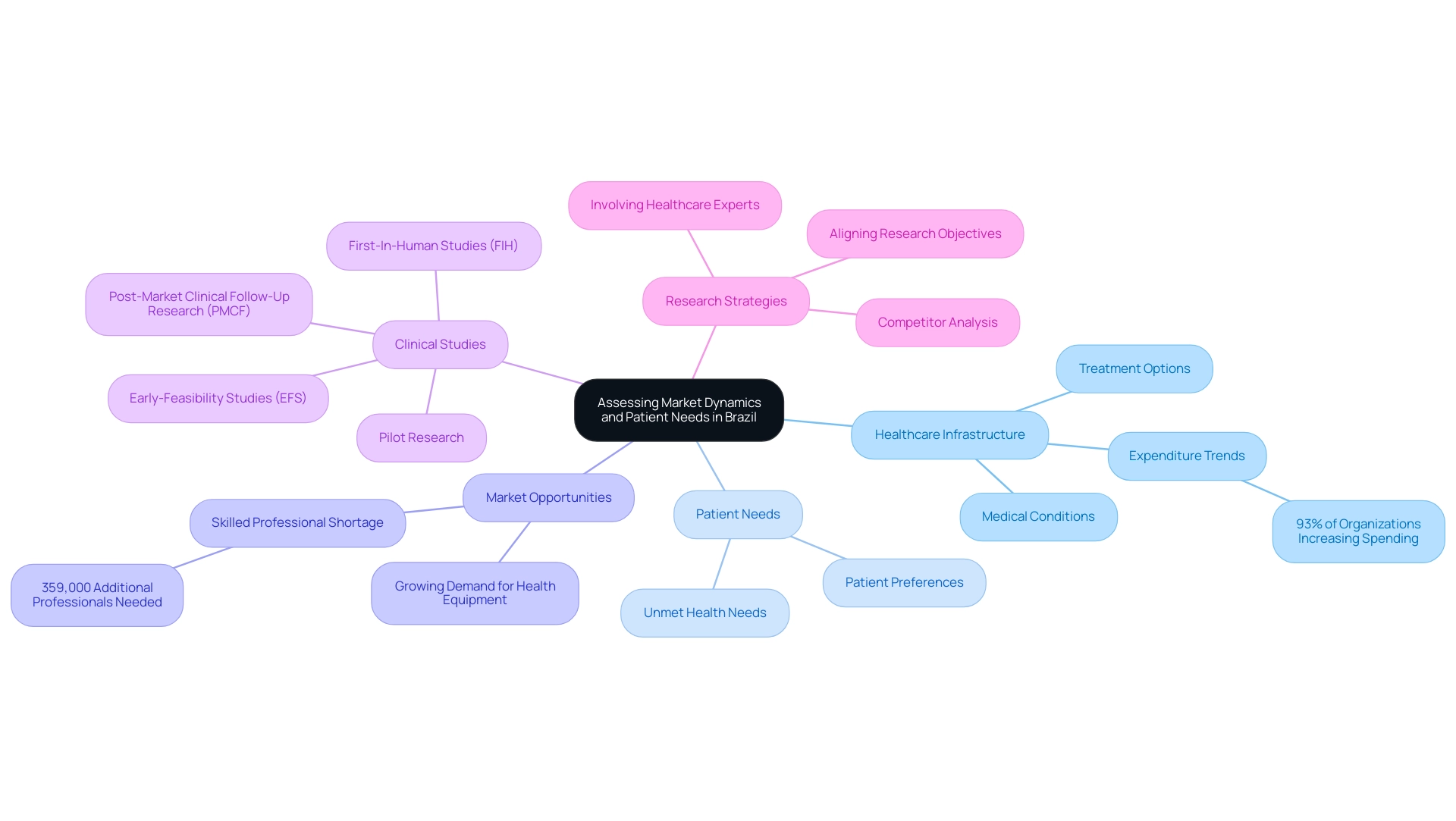
Challenges and Considerations for Early Feasibility Studies in Brazil
Conducting early feasibility assessments (EFS) in Brazil entails navigating a complex landscape of challenges that researchers must strategically address. Cultural differences significantly impact patient recruitment and engagement; thus, understanding local customs and communication styles is paramount. For instance, recognizing how familial and community ties influence health decisions can enhance recruitment efforts.
According to recent findings, the adoption of preventive behaviors among various demographics has shown disparities, highlighting the need for tailored engagement strategies. Logistical issues also pose substantial hurdles, particularly with the disparity in healthcare infrastructure between urban and rural areas, which can affect patient accessibility to trials. Moreover, ethical considerations, such as informed consent and patient privacy, must be stringently maintained to foster trust and ensure compliance with local regulations.
As emphasized by case studies, such as the confirmed Ehrlichiosis instance in Italy, awareness of local healthcare contexts is crucial for successful outcomes. Furthermore, navigating the regulatory environment requires familiarity with INVIMA, the Colombian National Food and Drug Surveillance Institute, which oversees medical device compliance and ensures adherence to established health standards.
bioaccess® offers comprehensive clinical trial management services to tackle these challenges, including:
- Feasibility assessments
- Site selection
- Compliance reviews
- Trial setup
- Project management
- Reporting
Expert opinions emphasize that cultural factors, including local health beliefs and practices, must be integrated into patient engagement strategies to improve recruitment outcomes. Researchers must also be prepared for potential delays in obtaining regulatory approvals, necessitating flexible timelines and contingency planning.
By anticipating these multifaceted challenges and developing tailored strategies that consider both cultural and logistical factors, researchers can significantly improve the prospects for successful EFS outcomes in Brazil while leveraging the expertise and services provided by bioaccess®.
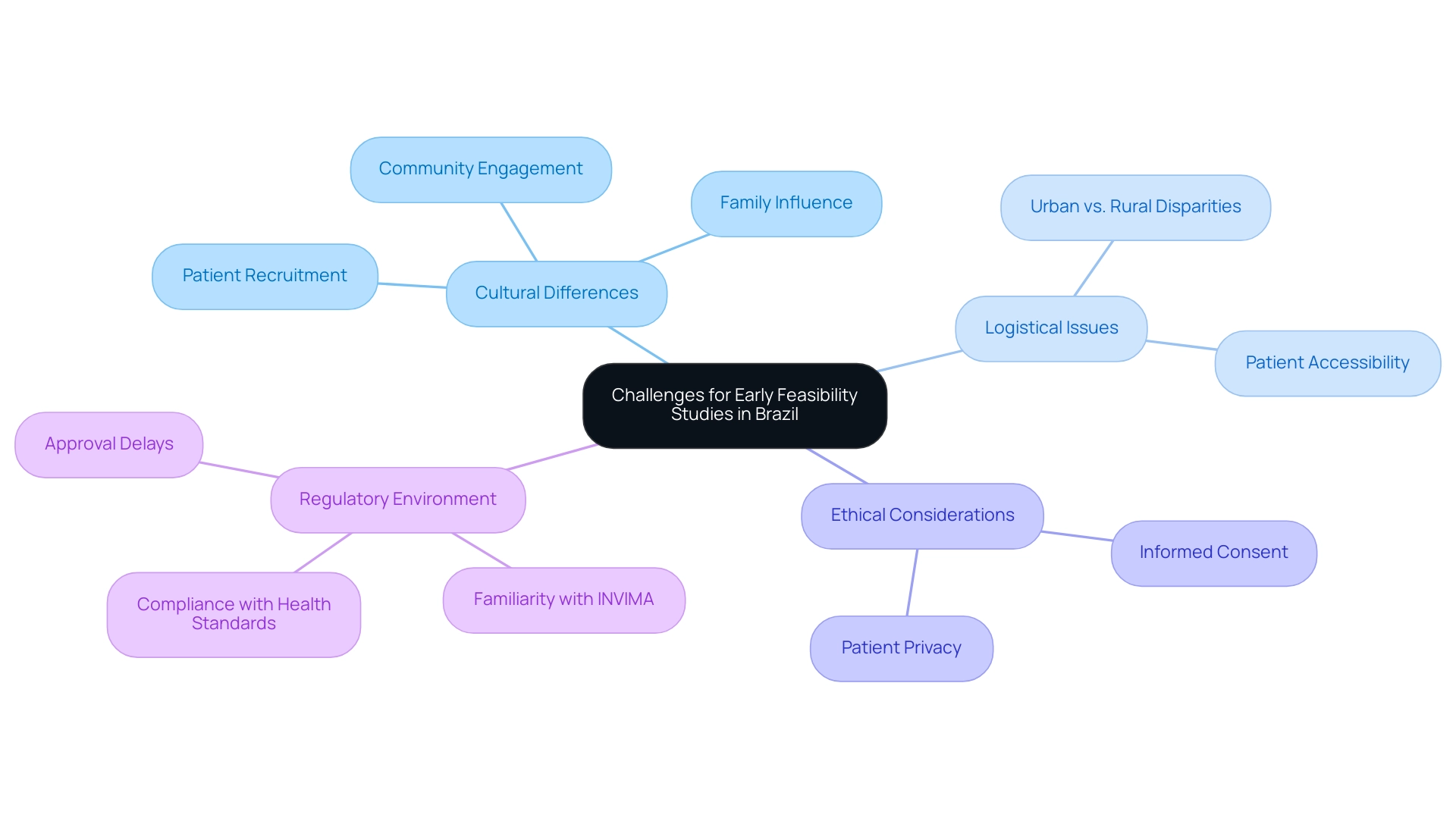
Conclusion
Early feasibility studies (EFS) are crucial in the Brazilian medical device development process, providing essential assessments of innovative technologies prior to extensive clinical trials. These studies help developers understand local market dynamics and regulatory frameworks, allowing for the refinement of device design and enhancement of safety. By identifying design flaws early, EFS streamline the path to market entry and increase the likelihood of successful adoption.
Navigating Brazil's regulatory environment, particularly the guidelines from ANVISA, is vital for effective clinical trial execution. A solid grasp of regulatory pathways and collaboration with local experts can facilitate approvals and improve study outcomes. The structured process of conducting EFS—from establishing objectives to reporting findings—underscores the importance of thorough planning and adherence to ethical standards.
Moreover, understanding market dynamics and patient needs is essential for ensuring that medical devices align with local healthcare demands. Engaging healthcare professionals and analyzing existing treatment options can reveal market gaps that new innovations can fill, thus boosting the chances of successful device adoption.
In conclusion, early feasibility studies are integral to the success of medical device development in Brazil. By leveraging insights from EFS, comprehending regulatory requirements, and addressing local market needs, stakeholders can significantly enhance their innovations' prospects. As the Brazilian healthcare landscape continues to evolve, the role of EFS will grow, driving advancements that can transform patient care and foster economic growth in the region.




